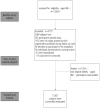Assessing cognitive impairment in home-dwelling Chinese elders aged 80+: a detailed survey of 13,000 participants focusing on demographic factors, social engagement, and disease prevalence
- PMID: 38628263
- PMCID: PMC11019016
- DOI: 10.3389/fpsyt.2024.1355708
Assessing cognitive impairment in home-dwelling Chinese elders aged 80+: a detailed survey of 13,000 participants focusing on demographic factors, social engagement, and disease prevalence
Abstract
Introduction: Cognitive Impairment (CI) in the elderly, encompassing conditions ranging from Mild Cognitive Impairment (MCI) to dementia, represents a growing public health concern globally. This study aims to investigate the prevalence and correlates of CI among individuals aged 80 and above.
Methods: The study conducts 13,027 elderly individual's door-to-door surveys, followed by the cross-tabulation of analysis data, logistic regression analysis, and health condition assessments to examine various determinants of CI.
Results: The current study's key findings demonstrate sub-statical correlations between CI and various factors, including educational attainment, marital status, and gender. Pronounced differences are evident between urban and rural demographics. Furthermore, aspects of social engagement, notably communication proficiency and sensory capabilities, exhibit a strong association with CI. Logistic regression analysis highlights that residing in rural areas (Odds Ratio [OR] = 0.637) and being female (OR = 0.71) are linked to a decreased risk of CI. In contrast, behavioral and health-related variables present a complex picture. Specifically, aggressive behavior (Adjusted OR = 1.881) and symptoms of depression (Adjusted OR = 0.549) contrast with conditions such as asthma (OR= 2.857) and cerebral infarction (OR=1.348), which elevate the risk of CI. Intriguingly, hyperlipidemia (OR= 0.671) appears to confer a protective effect against CI.
Conclusion: The study highlights the complexity of factors affecting CI in the elderly, advocating for a comprehensive approach to understanding and managing cognitive health.
Keywords: cognition function; diabetes; mini-cog; social interaction; socio-economic.
Copyright © 2024 Bian, Tian, Meng, Xu, Zhao, Gao and Bian.
Conflict of interest statement
The authors declare that the research was conducted in the absence of any commercial or financial relationships that could be construed as a potential conflict of interest.
Similar articles
-
Rural-urban Disparities in the Prevalence of Mild Cognitive Impairment and Dementia in Taiwan: A Door-to-door Nationwide Study.J Epidemiol. 2022 Nov 5;32(11):502-509. doi: 10.2188/jea.JE20200602. Epub 2021 Sep 29. J Epidemiol. 2022. PMID: 33840652 Free PMC article.
-
Prevalence and correlates of behavioral and psychiatric symptoms in community-dwelling elders with dementia or mild cognitive impairment: the Memory and Medical Care Study.Int J Geriatr Psychiatry. 2003 Feb;18(2):174-82. doi: 10.1002/gps.781. Int J Geriatr Psychiatry. 2003. PMID: 12571828
-
Prevalence of cognitive impairment no dementia in a rural area of Northern China.Neuroepidemiology. 2014;42(4):197-203. doi: 10.1159/000360138. Epub 2014 Apr 15. Neuroepidemiology. 2014. PMID: 24751796 Free PMC article.
-
Mild Cognitive Impairment among Elderly Persons Residing in an Urban Resettlement Colony in Delhi.Indian J Community Med. 2023 Sep-Oct;48(5):721-726. doi: 10.4103/ijcm.ijcm_8_23. Epub 2023 Sep 7. Indian J Community Med. 2023. PMID: 37970150 Free PMC article.
-
Marital Status and Cognitive Impairment among Community-Dwelling Chinese Older Adults: The Role of Gender and Social Engagement.Dement Geriatr Cogn Dis Extra. 2014 Oct 14;4(3):375-84. doi: 10.1159/000358584. eCollection 2014 Sep. Dement Geriatr Cogn Dis Extra. 2014. PMID: 25473404 Free PMC article.
References
-
- Ding D, Zhao Q, Guo Q, Liang X, Luo J, Yu L, et al. . Progression and predictors of mild cognitive impairment in chinese elderly: A prospective follow-up in the shanghai aging study. Alzheimer's Dementia: Diagnosis Assess Dis Monit. (2016) 4:28–36. doi: 10.1016/j.dadm.2016.03.004 - DOI - PMC - PubMed
LinkOut - more resources
Full Text Sources


